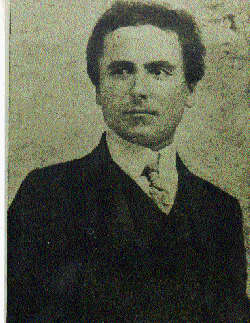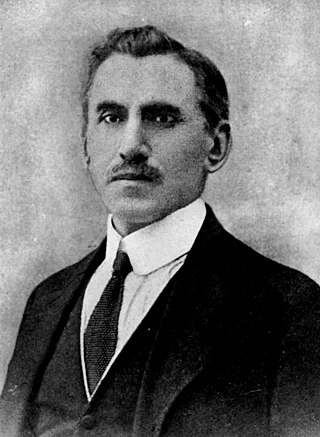Related Research Articles

Chiprovtsi is a small town in northwestern Bulgaria, administratively part of Montana Province. It lies on the shores of the river Ogosta in the western Balkan Mountains, very close to the Bulgarian-Serbian border. A town of about 2,000 inhabitants, Chiprovtsi is the administrative centre of Chiprovtsi Municipality that also covers nine nearby villages.
The siege of Adrianople in 813 was a part of the wars of the Byzantine Empire with the Bulgarian khan Krum. It began soon after the Byzantine field army was defeated in the battle of Versinikia on 22 June. At first the besieging force was commanded by Krum's brother. The khan himself went on with an army to Constantinople. After an unsuccessful Byzantine attempt to murder him ruined all prospects for negotiations with them, Krum ravaged much of Eastern Thrace and then turned against Adrianople which was still under siege. The city—one of the most important Byzantine fortresses in Thrace—held out for a while despite being attacked with siege engines. Yet, without any help from outside, the garrison was forced to capitulate due to starvation. On Krum's order the population of Adrianople and the surrounding area was transferred to Bulgarian territory north of the Danube.

Voydan Popgeorgiev – Chernodrinski was a Bulgarian playwright and dramatist from the region of Macedonia. His pseudonym is derived from the river Black Drin. Today he is considered an ethnic Macedonian writer in North Macedonia and a figure who laid the foundations of the Macedonian theatre and the dramatic arts.

Capital punishment in Bulgaria was abolished on December 12, 1998 with the last execution, that of attempted saboteur Georgi Alinski, having been carried out on November 4, 1989. The Parliament of Bulgaria had introduced a moratorium on July 7, 1990 and protocol number six of the European Convention on Human Rights came into force on October 1, 1999.
Kochan is a village in Southwestern Bulgaria. It is located in Satovcha Municipality, Blagoevgrad Province.

Postal codes in Bulgaria have four digits.

Petar Parchevich or Petar Mihaylov Parchev was a Bulgarian Roman Catholic archbishop, diplomat, scholar, baron of Austria and one of the architects behind the anti-Ottoman Chiprovtsi Uprising.
Vasil Todorov Gyuzelev is a Bulgarian historian who studies Bulgaria during the Middle Ages.
Prespa was a medieval town, situated in the homonymous area in south-western Macedonia. It was a residence and burial place of the Bulgarian emperor Samuel and according to some sources capital of the First Bulgarian Empire and seat of the Bulgarian Patriarchate in the last decades of the 10th century.
The 2016–17 First Professional Football League is the 93rd season of the top division of the Bulgarian football league system, the 69th since a league format was adopted for the national competition of A Group as a top tier of the pyramid and also the inaugural season of the First Professional Football League, which decides the Bulgarian champion. The season is the first with a new league structure and strict financial criteria where 14 clubs play each other home and away, until the league is split up in championship and relegation playoffs. The new league structure, inspired by the ones used by the Belgian First Division A and Danish Superliga, was approved by the Bulgarian Football Union on 6 June 2016. The fixtures were announced on 8 July 2016.

Plamen Tzvetkov was born on 8 August 1951 in Berlin (Germany) into a family of Bulgarian diplomats. He graduated with history major from the Sofia University “St. Kliment Ohridski” in 1976. In 1980 he defended his Ph.D. dissertation in Moscow State University on the topic: "Soviet policy of collective security and the Balkan countries during 1933-1935". In 1990 he published his habilitation work on "The European Powers, the Balkans and Collective Security (1933-1935)." From 1994 he began his lecturing work at the New Bulgarian University. In 1999 he defended the so-called higher doctoral thesis (Habilitationsschift) for the award of the degree "Doctor of Historical Sciences" on the theme "Small countries in the European policy during the time period of 1933-1939." Until 2000 he worked at the Institute for History at the Bulgarian Academy of Sciences, and from February 2002 he was named Professor of Modern and Contemporary History at New Bulgarian University where he taught until his death in November 2015. In 2007 Prof. Tzvetkov was given the NBU award for Best Professor of the Year.

Ivan Shishmanov was a Bulgarian writer, ethnographer, politician and diplomat. He served as Ambassador of Bulgaria to the Ukrainian State and the Ukrainian People's Republic.
Anna Doneva is a Bulgarian choreographer and contemporary dance teacher.:

The GERB—SDS is a Bulgarian two-party political coalition headed by Boyko Borisov.
References
- ↑ "За града" (in Bulgarian). Blagoevgrad.org. Archived from the original on 2008-06-02. Retrieved 2008-09-14.
- ↑ "Град Бургас" (in Bulgarian). Регионална библиотека "П. К. Яворов". Retrieved 2008-09-14.
- ↑ "Burgas Municipality". Burgas.
- ↑ "History of Burgas". In Your Pocket.
- 1 2 Петрински, Иван (2008). "Българският език: възродителен процес за имената на месеците". Истинската история на България (in Bulgarian). София: Ciela. p. 163. ISBN 978-954-28-0286-0.
- ↑ Vasmer query
- 1 2 "История на Габрово" (in Bulgarian). Zone Bulgaria. Retrieved 2008-09-14.
- ↑ "Името Хасково" (in Bulgarian). Haskovo Online. Retrieved 2008-09-14.
- ↑ Sahin, İlhan. Hasköy (TDV İslâm Ansiklopedisi) . 1997.
- ↑ "Как е получил град Кърджали името си?" (in Bulgarian). Община Кърджали. Retrieved 2008-09-14.
- 1 2 Матанов, Христо (1986). "Феодални княжества и владетели през последните десетилетия на XIV век". Югозападните български земи през XIV век (in Bulgarian). София: Наука и изкуство. p. 126.
- ↑ "История" (in Bulgarian). Община Ловеч. Retrieved 2008-09-14.[ dead link ]
- ↑ "История на средновековната крепост по археологични данни" (in Bulgarian). Община Перник. Archived from the original on 2008-09-16. Retrieved 2008-09-14.
- ↑ "Събраха в книга всичко за името на Перник". 21 October 2014.
- ↑ "История на Плевен" (in Bulgarian). Община Плевен. Retrieved 2008-09-14.
- ↑ "Тепетата на Пловдив" (in Bulgarian). omda.bg. Archived from the original on 2008-06-27. Retrieved 2009-01-16.
- ↑ "Двадесет и четирите имена на древния Пловдив".
- ↑ "Пловдив" (in Bulgarian). Мила Родино. Archived from the original on 2012-09-04. Retrieved 2008-09-14.
- ↑ "История на града" (in Bulgarian). Община Пловдив. Archived from the original on 2008-09-28. Retrieved 2008-09-14.
- ↑ Philippopolis (Thracia)
- ↑ Калоянов, Анчо (2002). "Названието на етнографската група хърцои и култа към бог Хърс". Старобългарското езичество (in Bulgarian). Варна: ЕИ "LiterNet". ISBN 954-304-009-5.
- 1 2 "История на Русе" (in Bulgarian). Регионален исторически музей—Русе. Archived from the original on 2008-06-10. Retrieved 2008-09-14.
- 1 2 3 "Шумен" (in Bulgarian). Шумен.net. Archived from the original on 2008-10-13. Retrieved 2008-09-14.
- 1 2 Болгарские алфавиты (in Russian). Archived from the original on December 11, 2007. Retrieved 2008-09-14.
- ↑ Katičić, Radislav (1976). Ancient Languages of the Balkans, Part One. Paris: Mouton. p. 144.
- ↑ "За Сливен" (in Bulgarian). БНС – Сливен. Archived from the original on 2008-09-28. Retrieved 2008-09-14.
- 1 2 "гр. Смолян" (in Bulgarian). BGGLOBE. Retrieved 2008-09-14.
- ↑ "София" (in Bulgarian). Мила Родино. Archived from the original on 2007-12-19. Retrieved 2008-09-14.
- 1 2 "Стара Загора" (in Bulgarian). Верея Тур. Archived from the original on 2007-01-17. Retrieved 2008-09-14.
- ↑ "Търговище" (in Bulgarian). Bulgaria Inside. Retrieved 2008-09-14.
- 1 2 "Имената на днешната Варна" (in Bulgarian). Varna.Info.bg. Archived from the original on 2008-09-28. Retrieved 2008-09-14.
{{cite web}}: CS1 maint: bot: original URL status unknown (link) - ↑ "Търново—политически, религиозен и културен център на Второто българско царство" (in Bulgarian). DiscoveryBG. Archived from the original on 2008-05-17. Retrieved 2008-09-14.
- ↑ "История" (in Bulgarian). Официален сайт на Велико Търново. Retrieved 2008-09-14.
- 1 2 "Видин" (in Bulgarian). Archived from the original on 2009-01-29. Retrieved 2008-09-14.
- ↑ "Видин" (in Bulgarian). BG-Tourinfo. Retrieved 2008-09-14.
- ↑ "Враца— кратка справка" (in Bulgarian). PureBulgaria. Retrieved 2008-09-14.
- 1 2 "Туризъм" (in Bulgarian). Област Ямбол. Archived from the original on 2008-06-11. Retrieved 2008-09-14.
- Георгиев, Владимир; et al. Български етимологичен речник. София: БАН. ISBN 954-430-633-1. OCLC 6489268.
- Чолева-Димитрова, Анна М. (2002). Селищни имена от Югозападна България: Изследване. Речник (in Bulgarian). София: Пенсофт. ISBN 954-642-168-5. OCLC 57603720.
- Vasmer, Max. "Vasmer's Etymological Dictionary" . Retrieved 2008-09-14.